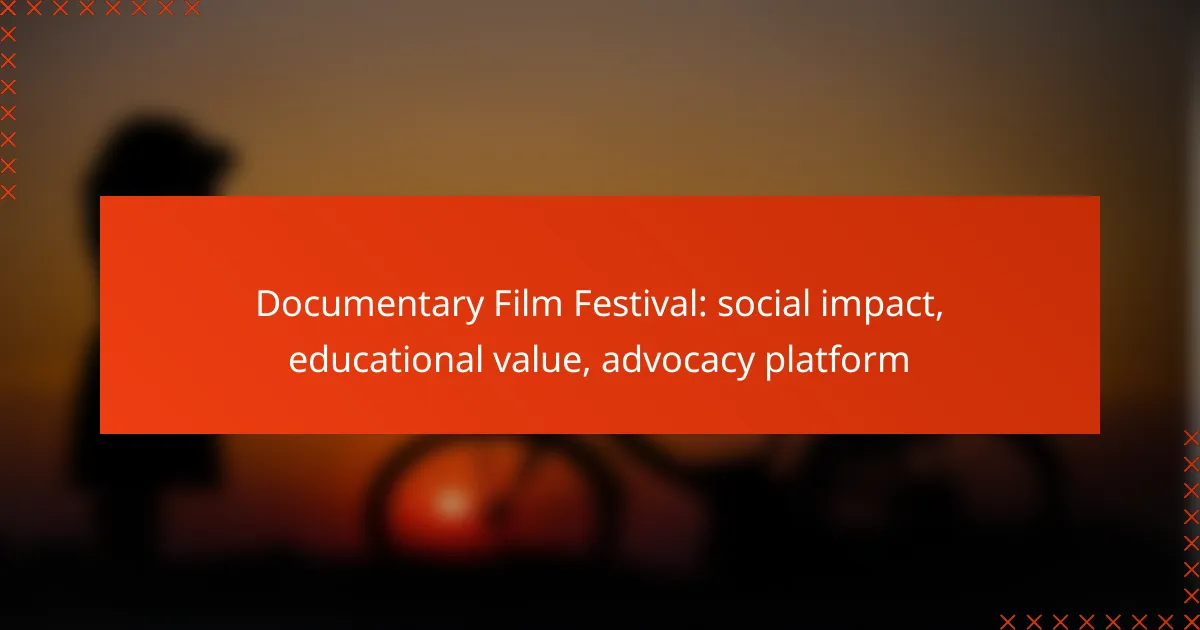Cultural film festivals are essential for promoting heritage and fostering cross-cultural dialogue by showcasing a rich array of narratives that reflect diverse backgrounds. These events create opportunities for filmmakers and audiences to engage with global perspectives, enhancing understanding and appreciation for various cultures. Through the lens of cinema, they facilitate meaningful conversations and connections among communities, celebrating both Indigenous and multicultural histories.

How do cultural film festivals promote heritage in Australia?
Cultural film festivals in Australia play a vital role in promoting heritage by showcasing diverse narratives that reflect the country’s rich cultural tapestry. They create platforms for dialogue and understanding among various communities, fostering appreciation for both Indigenous and multicultural histories.
Showcasing Indigenous stories
Indigenous stories are central to cultural film festivals in Australia, providing a unique opportunity for Aboriginal and Torres Strait Islander filmmakers to share their perspectives. These films often highlight traditional practices, languages, and contemporary issues faced by Indigenous communities, allowing audiences to connect with their heritage.
By featuring Indigenous narratives, festivals help to educate the public about the significance of cultural preservation and the ongoing impact of colonization. This engagement can lead to greater respect and recognition of Indigenous rights and contributions to Australian society.
Highlighting multicultural narratives
Cultural film festivals also emphasize multicultural narratives, reflecting the diverse backgrounds of Australia’s population. Films from various cultural communities explore themes of identity, migration, and belonging, inviting viewers to engage with different experiences and histories.
These narratives not only enrich the festival experience but also promote cross-cultural dialogue. By showcasing films from different ethnic groups, festivals encourage understanding and empathy among audiences, fostering a sense of unity in diversity.
Preserving historical films
Preserving historical films is another crucial aspect of cultural film festivals in Australia. Many festivals curate retrospectives that highlight significant works from the past, ensuring that important cultural artifacts are not forgotten. This preservation effort helps to maintain a connection to Australia’s cinematic heritage.
Furthermore, festivals often collaborate with archives and cultural institutions to restore and digitize classic films, making them accessible to new generations. This initiative not only safeguards the past but also inspires contemporary filmmakers to draw from historical influences in their own work.

What role do cultural film festivals play in cross-cultural dialogue?
Cultural film festivals serve as vital platforms for cross-cultural dialogue by showcasing diverse narratives and fostering understanding among different communities. They create opportunities for filmmakers and audiences to engage with various cultural perspectives, promoting empathy and collaboration.
Facilitating discussions among filmmakers
Cultural film festivals provide a unique space for filmmakers from different backgrounds to share their experiences and insights. Panel discussions, Q&A sessions, and networking events allow creators to delve into the themes of their films, encouraging dialogue about cultural nuances and shared human experiences.
These discussions can lead to collaborative projects that bridge cultural gaps, as filmmakers often find common ground in their storytelling approaches. For instance, a festival might host a roundtable featuring directors from various countries, fostering an exchange of ideas that can inspire future works.
Encouraging audience engagement
Festivals actively engage audiences by offering screenings followed by discussions, allowing viewers to express their thoughts and ask questions. This interaction enhances the viewing experience, as audiences gain deeper insights into the cultural contexts of the films.
Workshops and interactive sessions can further enhance audience involvement, encouraging participants to explore filmmaking techniques and cultural storytelling. For example, a workshop on documentary filmmaking might attract attendees interested in understanding different cultural narratives through a practical lens.
Building international partnerships
Cultural film festivals often serve as catalysts for international partnerships among filmmakers, distributors, and cultural organizations. By bringing together diverse stakeholders, festivals can facilitate collaborations that extend beyond the event itself.
These partnerships can lead to co-productions, funding opportunities, and shared resources, benefiting filmmakers from various regions. For instance, a festival may connect a European filmmaker with a production company in Asia, resulting in a project that highlights both cultures and broadens its audience reach.

How do cultural film festivals provide global perspectives?
Cultural film festivals offer global perspectives by showcasing diverse narratives from various countries, allowing audiences to engage with different cultures and viewpoints. These festivals serve as platforms for filmmakers to present their work, fostering understanding and dialogue among attendees from around the world.
Featuring international filmmakers
Cultural film festivals prominently feature international filmmakers, providing them with opportunities to showcase their unique stories and artistic visions. This exposure allows filmmakers from underrepresented regions to reach wider audiences, often leading to collaborations and increased visibility for their work.
For example, festivals like the Cannes Film Festival or the Toronto International Film Festival highlight films from various countries, celebrating both established and emerging talent. This diversity enriches the festival experience, offering attendees a chance to discover new voices and perspectives.
Exploring global themes
Global themes are central to many films presented at cultural festivals, addressing issues such as migration, identity, and social justice. These themes resonate across borders, encouraging audiences to reflect on shared human experiences and challenges.
Films that tackle universal topics, such as climate change or cultural heritage, can spark meaningful discussions among viewers. Festivals often include panels or Q&A sessions with filmmakers, enhancing the exploration of these themes and fostering deeper understanding.
Promoting cultural exchange
Cultural film festivals promote cultural exchange by bringing together diverse audiences and creators, facilitating dialogue and interaction. Attendees have the chance to engage with filmmakers, participate in workshops, and attend discussions that deepen their understanding of different cultures.
Additionally, many festivals incorporate local traditions, cuisine, and art into their programming, creating a holistic cultural experience. This exchange not only enriches the festival atmosphere but also helps to break down cultural barriers and build connections among participants.

What are the key criteria for selecting films in cultural festivals?
The key criteria for selecting films in cultural festivals include their relevance to cultural themes, artistic merit, and audience appeal. These factors ensure that the films not only represent diverse perspectives but also engage viewers effectively.
Relevance to cultural themes
Films selected for cultural festivals should resonate with specific cultural themes that reflect the heritage and traditions of various communities. This relevance can be assessed by examining the film’s narrative, characters, and settings, which should authentically represent the culture being showcased.
For instance, a film that explores indigenous practices or historical events can provide valuable insights into a culture’s identity. Festivals often prioritize films that foster understanding and appreciation of cultural diversity, making thematic relevance crucial.
Artistic merit and innovation
Artistic merit involves evaluating the film’s direction, cinematography, and overall production quality. Innovative storytelling techniques, unique visual styles, and creative sound design can elevate a film’s status within a festival context.
Films that push boundaries or introduce new perspectives often stand out. For example, a documentary that employs an experimental narrative structure may captivate audiences and critics alike, making it a strong contender for selection.
Audience appeal and accessibility
Audience appeal is essential for ensuring that films resonate with festival-goers. This can include factors such as engaging storytelling, relatable characters, and emotional depth. Films that evoke strong reactions or provoke thought are often favored.
Accessibility also plays a role; films should be understandable to a broad audience, potentially including subtitles or translations for non-native speakers. Festivals may consider how well a film can connect with diverse viewers, enhancing its chances of selection.

What are the benefits of attending cultural film festivals?
Attending cultural film festivals offers numerous advantages, including enhanced networking, exposure to diverse viewpoints, and access to exclusive screenings. These events foster connections among filmmakers, audiences, and industry professionals, enriching the cultural landscape.
Networking opportunities
Cultural film festivals provide a unique platform for networking with filmmakers, producers, and other industry professionals. Attendees can engage in discussions, share ideas, and potentially collaborate on future projects.
To maximize networking, consider attending panel discussions and workshops where industry leaders share insights. Bring business cards and be prepared to introduce yourself and your work succinctly.
Exposure to diverse viewpoints
These festivals showcase films from various cultures, offering insights into different societal issues and artistic expressions. This exposure helps broaden perspectives and fosters understanding among diverse audiences.
Engaging with films from different regions can challenge preconceived notions and spark meaningful conversations. Look for Q&A sessions with filmmakers to deepen your understanding of their cultural contexts.
Access to exclusive screenings
Many cultural film festivals feature exclusive screenings of films that may not be widely available. This access allows attendees to experience groundbreaking works before they hit mainstream distribution.
Check the festival schedule in advance to identify must-see films and plan your attendance accordingly. Arrive early to secure good seating, as popular screenings may fill up quickly.

How can filmmakers participate in cultural film festivals?
Filmmakers can participate in cultural film festivals by submitting their films for consideration and engaging in workshops and panels. These festivals provide a platform for showcasing diverse narratives and fostering cross-cultural dialogue.
Submitting films for consideration
To submit films for consideration, filmmakers should first research the specific requirements of each festival, as guidelines can vary widely. Most festivals require a completed application form, a screening copy of the film, and often a submission fee, which can range from a nominal amount to several hundred dollars.
It’s essential to pay attention to deadlines, which can be several months in advance of the festival dates. Filmmakers should also consider the festival’s theme and audience to ensure their work aligns with the event’s focus, enhancing the chances of acceptance.
Attending workshops and panels
Attending workshops and panels at cultural film festivals offers filmmakers valuable opportunities for learning and networking. These sessions often feature industry experts discussing topics such as storytelling techniques, funding strategies, and distribution methods.
Filmmakers should prepare to engage actively by asking questions and participating in discussions. This interaction can lead to meaningful connections with other filmmakers and industry professionals, potentially opening doors for future collaborations or projects.



